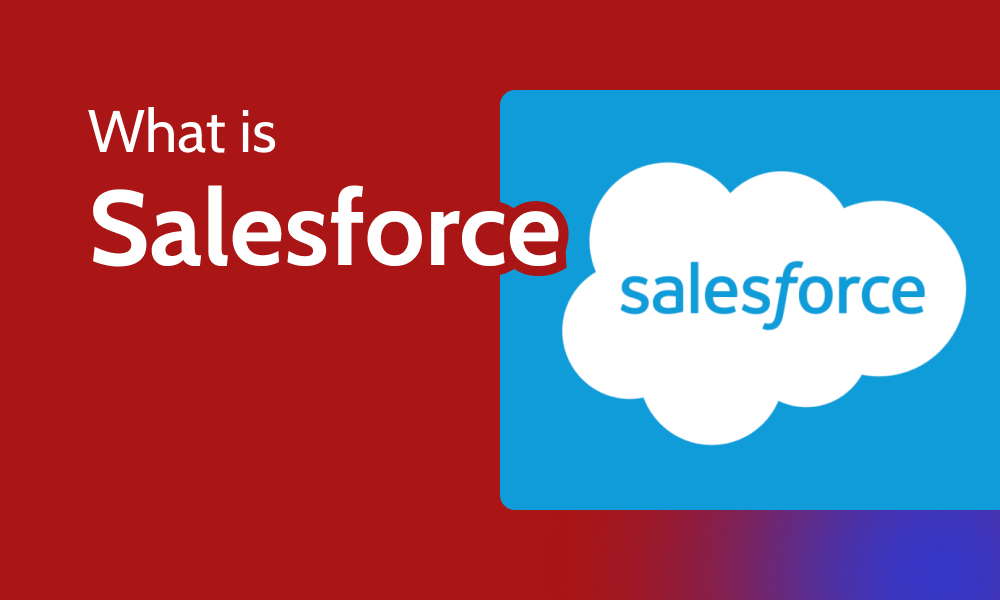Salesforce is a leading cloud-based customer relationship management (CRM) platform that helps businesses manage their customer relationships by centralizing data, automating tasks and generating insights.
Despite its huge presence in global ecommerce and wide adoption across industries since its founding in 1999, those who haven’t interacted with it directly might not understand what Salesforce is and what features it offers. Plus some users find it has a steep learning curve, and confusing pricing tiers make it complex for small teams or those new to CRMs.
In this guide, we break down the core components of Salesforce, explore the technology that powers the integrated platform, and highlight the key considerations for leveraging it in business.
What Is Salesforce in Simple Terms?
Salesforce is a cloud-based business software platform that helps companies manage their sales, service and marketing campaigns in one centralized location.
Companies use Salesforce to store customer information, making it easier for sales, marketing and customer service teams to access real-time data, collaborate efficiently and deliver better customer experiences.
Salesforce is built entirely in the cloud and eliminates the need for physical servers. The platform is highly customizable. Developers and admins can tailor it to unique business processes, whether for small businesses, large enterprises or nonprofit organizations. Its open architecture facilitates easy integration with third-party apps, enhancing customization.
What Is Salesforce Used for?
Salesforce is primarily used to manage sales, service and marketing campaigns across an organization. Companies use Salesforce to track leads, manage sales pipelines and close deals through Sales Cloud.
Beyond sales, businesses also use Salesforce to store and analyze customer data, which can help sales teams offer more personalized engagement and improve customer satisfaction.
Salesforce is also used for customer support and service management through Service Cloud. The module helps companies handle support tickets, live chats and phone inquiries through a unified system, which can improve response times and issue resolution.
Through Commerce Cloud, Salesforce also provides e-commerce, analytics and collaboration across industries. Commerce Cloud helps businesses create personalized shopping experiences, manage orders and optimize online sales channels. Dashboards and reports help stakeholders track progress, measure key performance indicators (KPIs) and make data-informed decisions.
Types of Salesforce Services
Salesforce offers a broad range of cloud-based services designed to help businesses manage their sales, marketing, customer service, commerce and more. The services are referred to as “Salesforce products.”
Below, we explore the 10 main Salesforce services and look at their key features and unique roles within the platform.
Sales Cloud
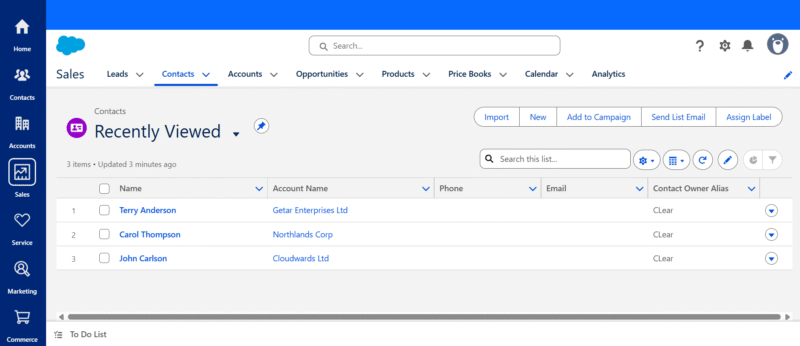
Sales Cloud helps sales teams organize leads, predict sales and close deals.
Sales Cloud is a CRM platform solution designed to streamline the sales process and help boost a sales team’s productivity and performance. It helps businesses track progress from lead to conversion, forecast future sales and automate the sales process to shorten the sales cycle, and improve customer acquisition outcomes.
Service Cloud
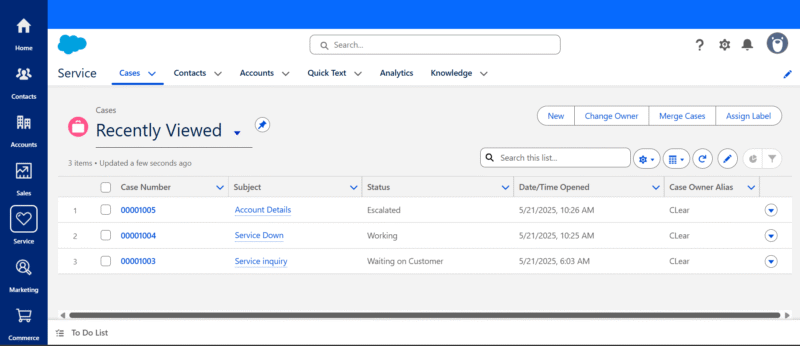
Service Cloud helps teams resolve customer issues with
smart tools and multi-channel support.
Service Cloud is a customer service platform that helps businesses manage support requests. It offers tools to deliver fast, personalized customer service across all channels.
Marketing Cloud
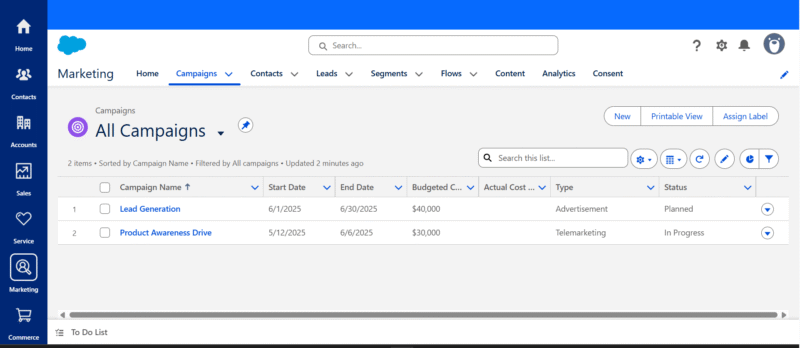
Marketing Cloud offers AI-powered campaigns across email, social media and digital ads.
Marketing Cloud is a digital marketing automation platform for personalized marketing campaigns across various channels. It helps businesses engage with customers through email and social media channels. Marketing Cloud leverages AI and real-time data to create targeted and personalized digital ads to improve client conversion.
Commerce Cloud
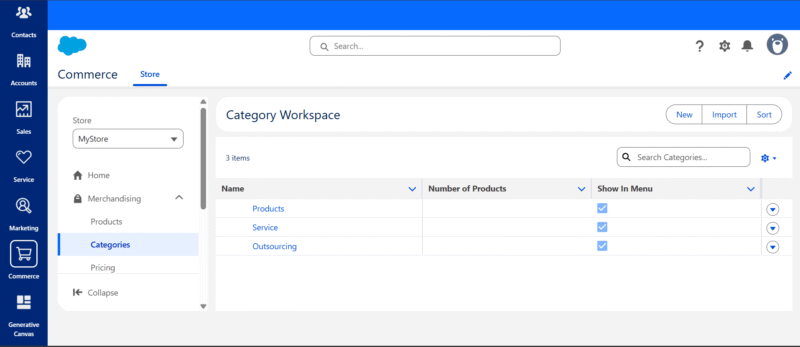
Commerce Cloud manages online stores with AI-driven personalization,
order management and real-time inventory control.
Commerce Cloud is an e-commerce platform that enables retailers to deliver personalized shopping experiences and manage all commerce activities from a single platform. It streamlines order management, inventory control and customer interactions by integrating AI to enhance retail operations.
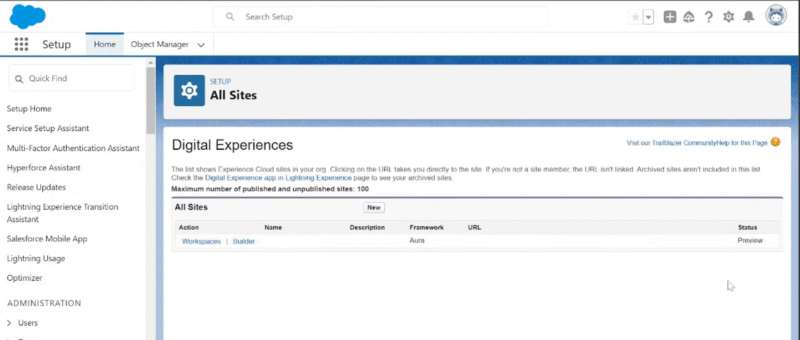
Experience Cloud lets you build custom portals that
securely connect to your Salesforce data.
Experience Cloud is a powerful digital experience platform that enables businesses to create secure, branded portals for customers, partners and employees. It allows organizations to build self-service portals, collaboration hubs and customer engagement sites that are all connected to Salesforce data.
CRM Analytics (Tableau)
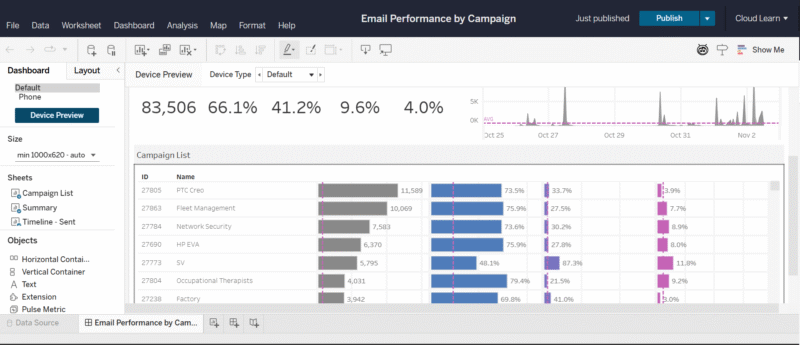
CRM Analytics turns data into insights, helping teams make
smarter decisions with interactive dashboards.
CRM Analytics is a business intelligence tool that transforms raw data into interactive dashboards for better decision-making.
MuleSoft
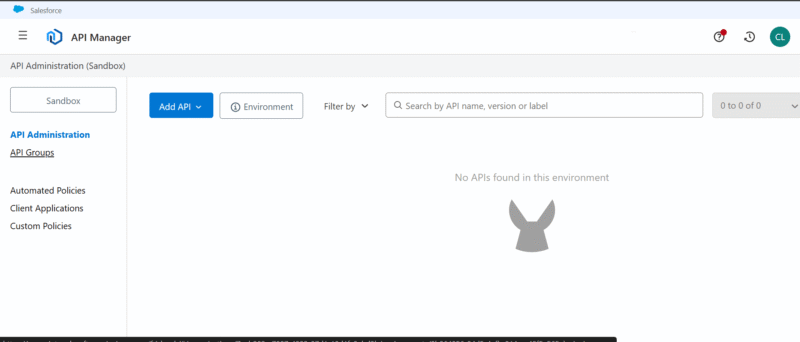
MuleSoft links Salesforce to other business systems, ensuring
your data is in sync and easy to access.
MuleSoft is an API-led platform that allows Salesforce to connect with external systems, such as enterprise resource planning (ERP) tools, databases and legacy software. It allows both developers and admins to build integrations between Salesforce and external systems, which allows the entire organization to work from synchronized and accurate data.
Data Cloud
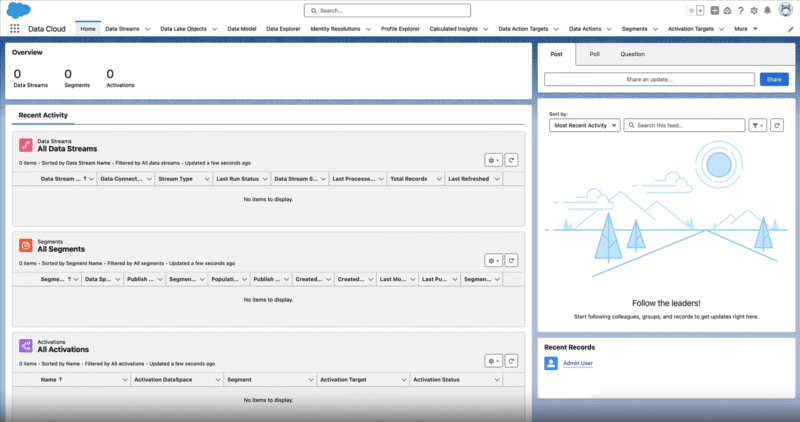
Data Cloud unifies all your customer data into a single view.
Data Cloud centralizes and harmonizes diverse business data — such as telemetry, web engagement and unstructured content — into a single, real-time view of customer data. It empowers teams across sales, services and marketing to deliver personalized experiences, utilize automation and maintain secure customer engagement at scale.
Slack
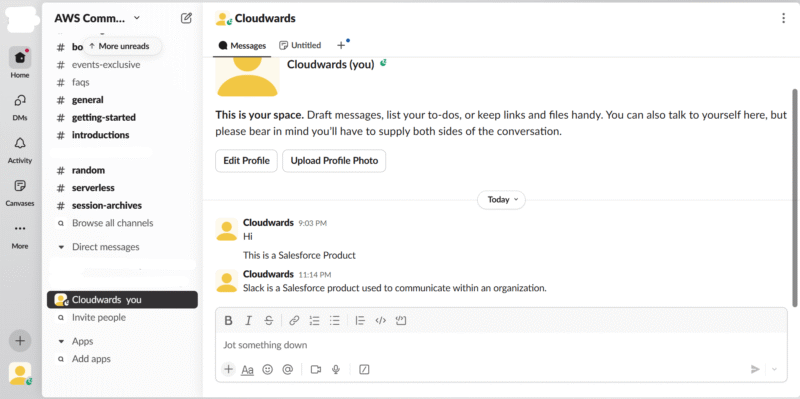
Slack brings conversations, apps and Salesforce alerts together in one app.
In 2020, Salesforce bought Slack, a communication and collaboration tool that connects people, apps and data in a single platform. While Slack can still be used as an independent tool, it also integrates deeply with the Salesforce platform, which allows teams across an organization to work together more effectively. It helps keep the conversation flowing and automates notifications from dashboards and other systems.
Agentforce
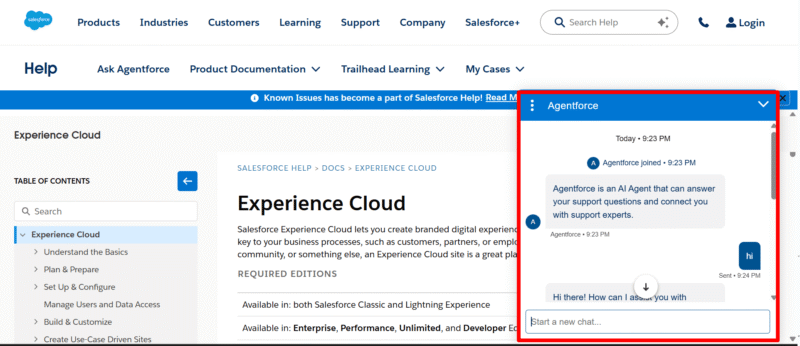
Agentforce boosts customer service through customized
AI agents that can assist customers with issues.
Agentforce is an AI-driven workforce management solution mainly developed for contact centers and customer support agents. It helps organizations build and customize AI agents that can support their employees and customers. Agentforce enhances productivity and enables more personalized service delivery.
Other Salesforce Services
Salesforce provides a wide range of specialized tools and services tailored for specific industries, departments and business goals. They easily integrate with the Salesforce ecosystem and help businesses manage customer data, automate processes and deliver personalized experiences. Other noteworthy Salesforce services include the following:
- Education Cloud: This product is designed to enable educational institutions to manage the complete student journey — from recruitment to alumni engagement — on a single, centralized platform. It integrates with existing learning management systems to support academic and administrative excellence.
- Health Cloud: This product is designed for healthcare and life sciences organizations. It is a patient-relationship management platform that helps healthcare providers manage patient records, appointments and care plans.
- Einstein AI: This is a layer of artificial intelligence built into the Salesforce platform. It delivers predictive and generative AI capabilities to automate decisions and enhance productivity.
- Nonprofit Cloud: This product is built for mission-driven organizations such as NGOs and charities. Its features include donor engagement tools, grant management, volunteer coordination and measuring impact all in one system.
- Financial Services Cloud: This is a CRM built for financial institutions, such as banks, wealth managers and insurers. It offers specialized tools for managing client relationships, handling compliance and streamlining customer onboarding.
Salesforce Benefits
Salesforce offers a powerful suite of business software solutions suitable for businesses of all sizes. Here are five key benefits that make Salesforce beneficial for organizations.
- Customer overviews: Salesforce consolidates all customer interactions from multiple touchpoints — such as email, phone, web and social media — into a centralized profile. This helps sales, admin and development teams understand customer behavior, history and preferences, which fosters more personalized and effective interactions.
- Enhanced team collaboration: Salesforce can enhance communication and collaboration within an organization through Slack and integrated workflows across Sales Cloud, Service Cloud and Commerce Cloud. Teams across the organization can work from a single point of reference, which ensures that no customer need or update is missed.
- Intelligent automation and artificial intelligence: Salesforce Einstein offers AI-powered features including predictive scoring, automated insights and smart recommendations. This allows organizations to automate routine tasks, optimize campaigns and make decisions based on real-time business data.
- Scalability and customization: The Salesforce platform is highly scalable and supports extensive customization via third-party apps, APIs and low-code tools. Businesses can adapt Salesforce to their unique needs, integrate it with existing systems, and support long-term digital transformation initiatives.
- Enhanced decision-making: Salesforce has powerful dashboards and analytics tools that help organizations track progress, monitor KPIs and uncover insights in real time. This leads to faster, more informed decisions and helps improve outcomes from business activities such as marketing campaigns and customer acquisition strategies.
Challenges of Using Salesforce
Salesforce presents several challenges that organizations must navigate. We examine five common challenges below that Salesforce customers may encounter when using the platform in their organization.
- Complex setup and configuration: Flexibility and customizability are two of Salesforce’s strengths, but they also make the initial setup process time-consuming. Configuring services such as Sales Cloud and Service Cloud — especially when integrating third-party apps and custom workflows — may require organizations to hire expert admins or developers to avoid inefficiencies and misconfigurations.
- Steep learning curve: Learning how to navigate and fully utilize all Salesforce tools can be overwhelming, especially for new users. Users may need to go through certification and training programs, which require time and resources.
- High implementation and licensing costs: Salesforce can be expensive, especially for small and mid-size businesses. Licensing fees, implementation costs and ongoing maintenance can add up quickly. Third-party integrations and premium features further increase costs. Companies must carefully budget for initial setup, training and future scaling to avoid unexpected costs. If businesses are on a tight budget, they should consider more affordable CRM options.
- Data migration and integration challenges: While Salesforce supports integration with various systems, challenges may arise when transferring or syncing data across legacy tools, external data centers or custom-built apps. Improper data mapping or synchronization issues can lead to gaps in the view of customer data or hinder real-time reporting.
- Data overload and quality control: The Salesforce platform collects vast amounts of customer information, but without proper data governance, teams can face business data inconsistencies, or duplicated or outdated records. The system may also become sluggish due to large data volumes, complex automations or too many customizations.
Salesforce Architecture
Salesforce operates on a multi-tenant cloud infrastructure, which is when multiple customers share the same underlying infrastructure while keeping their data cloud and environments completely secure and isolated. At its core, Salesforce runs on a global network of data centers that hosts the platform’s servers, databases and applications.
Salesforce architecture uses a metadata-driven development model. This means custom objects, fields, workflows and complex business logic can be modified without touching the underlying codebase. The platform automatically generates the necessary infrastructure based on the metadata definitions, enabling rapid deployment.
Designed for global scalability, Salesforce features a robust infrastructure, with a network of geographically distributed data centers that deliver low-latency access to users worldwide. The platform employs content delivery networks (CDNs) to cache static resources closer to end users, and dynamic content is routed to the nearest available Salesforce data center.
For large enterprises, Salesforce offers instance partitioning and performance monitoring tools to maintain optimal system responsiveness even with thousands of concurrent users.
Salesforce Real-World Use Case Examples
Learn how some leading brands are achieving significant business outcomes using Salesforce.
Salesforce CRM Pricing: Is It Expensive?
Yes, Salesforce CRM can be expensive. That said, the pricing model is highly flexible and product-dependent. Each Salesforce product comes with its own tiered pricing, which ranges from basic plans for small teams to advanced enterprise-grade packages with robust AI and automation features.
For example, Sales Cloud starts off at a relatively affordable price of $25 per user per month, but costs can increase significantly with add-ons such as Einstein AI or advanced analytics.
Salesforce is generally considered a mid- to high-end CRM solution. It is more expensive than some basic CRMs such as Hubspot or Zoho but offers far more scalability, customization and enterprise-grade features. It has solutions for startups and large enterprises alike, but smaller companies may find the total cost of ownership to be steep when factoring in customization, implementation and ongoing support.
Salesforce pricing varies widely based on a company’s size and goals, and the complexity of its CRM strategy. Adopting Salesforce can be expensive, especially for large deployments, but many organizations see it as a worthwhile investment due to the platform’s capabilities, AI integration and ability to unify sales, service, marketing and analytics.
Who Are Salesforce’s Top Competitors?
Salesforce is a leader in the CRM and cloud-based business software space, but it operates in a highly competitive market. Several major players offer similar customer relationship management solutions, marketing automation and business productivity tools. The following are five key competitors challenging Salesforce in the market.
- Microsoft Dynamics 365: Microsoft Dynamics 365 is a strong competitor that combines CRM and enterprise resource planning in one platform. It integrates deeply with other Microsoft products, such as Office 365, Teams and Azure, which makes it attractive to businesses already in the Microsoft ecosystem.
- Hubspot CRM: Hubspot is known for its user-friendly interface and freemium model, which makes it a popular choice for startups and small businesses. Although it does not have the same depth of enterprise-level features as Salesforce, it offers solid CRM, marketing automation and sales tools that are easy to implement and use.
- Zendesk: Zendesk specializes in delivering customer service and support solutions to its clients. It offers cloud-based solutions for ticketing, live chat, knowledgebase management and customer communication workflows. Zendesk appeals to businesses seeking a fast, lightweight deployment with minimal configuration, making it a good choice for small and mid-size organizations.
- SAP Customer Experience: SAP’s CRM solution is designed for large enterprises and is part of its broader ERP and data management ecosystem. It offers tools for customer data management, marketing, commerce and customer service. Customers already using SAP ERP often choose this platform for tight integration and a unified data model.
- Zoho CRM: Zoho CRM is a cost-effective alternative for small and mid-size businesses. It offers a wide range of CRM features, such as sales automation, analytics and customer service tools. Its appeal lies in its affordability, ease of use and integration with Zoho’s broader suite of business applications, like Zoho Projects or Zoho WorkDrive.
Final Thoughts
Salesforce is a powerful CRM platform that transforms how businesses connect with customers, streamline operations and drive growth. It offers tailored solutions to meet business needs, with benefits such as centralized data, automation and scalability. It is suitable for businesses of all sizes who can afford the price tag and handle the setup complexity.
Thank you for taking the time to learn about Salesforce with us. Have you used any of Salesforce’s products? If so, how was the experience? How does Salesforce work for your organization? We would love to hear from you. Feel free to engage with us in the comment section and share this article with your network.
FAQ: What Does Salesforce Do?
-
Salesforce is used to manage customer relationships, automate tasks and improve collaboration across teams.
-
Microsoft Dynamics 365 is Salesforce’s main competitor, mainly for enterprise clients. It offers similar CRM and ERP tools, with strong integration with the Microsoft ecosystem.
-
Salesforce can be challenging to learn at first, especially for beginners, but it becomes easier with hands-on practice and the help of learning resources such as Trailhead, Salesforce’s free training platform.
-
Salesforce helps businesses keep track of their customers, manage sales and automate tasks such as sending emails and scheduling calls from one platform.

